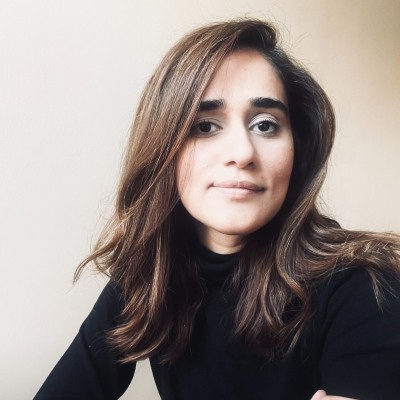
From Pakistan, Razzaq’s interest in design began after several years working in the fashion industry. As she lived and worked in Pakistan, she noticed the disturbing air quality as pollutants grew worse and worse, and watched her community suffer from breathing issues. “People couldn’t go out because the air quality was bad, and it affected pregnant women as well. It was getting worse every year,” said Razzaq of the reality she observed in Pakistan.
Razzaq was shocked to learn that a major contributor to the pollutants in Pakistan was the textiles industry. “I was really depressed and devastated to know of what we have done,” said Razzaq. This revelation of the industry she built her career in motivated her to turn her career towards one that built a positive society – not one that worsened her community’s living conditions.
With this goal in mind to design a better world, Razzaq began searching for universities in the United States to apply to a master’s design program. After applying to several American universities, Razzaq was offered a 50% scholarship for a master’s design program in VPA through a connection she created with a faculty member. She had to be honest. “I supported myself, I’m working on multiple jobs. A 50% scholarship makes it impossible for me to come to another country and study.”
For the first time in the history of the design program, the faculty decided to create a fellowship for Razzaq to allow her to pursue her passions at Syracuse University and apply the critical thinking and design skills learned there to create solutions in her home country.
Beyond her career in the fashion industry, Razzaq had spent her free time in Pakistan working for an NGO tutoring homeless children. During this time, she conducted research and created her thesis on the need for family’s to be more involved in their children’s upbringing. This goal – to pour herself into the future generations and communities of Pakistan, designing a better society – was exactly the reason she hoped to study at Syracuse and obtain her masters.
Through her current studies, she’s researching sustainable bioplastics to recreate toxic production processes within the textiles industries and designing sustainable packaging for industrial use. Razzaq has already used her fellowship to design a sustainable future.
Razzaq is enrolled in the Intelligence++ class in partnership with VPA, InclusiveU and the Blackstone LaunchPad at Syracuse University, which focused on inclusive design and entrepreneurship. The class asks students to shadow individuals with various disabilities and then design technology for their wellness. In this class, Razzaq is currently created a sensory playground as a calming outlet for an individual with excessive energy.
Razzaq’s first year at Syracuse University has been packed with designing solutions to societal problems from engineering inclusivity to creating more sustainable production cycles. Reflecting on her challenging work and success, Razzaq has one thing to share with those in her home country: to include women in design and higher education. In Pakistan, medicine and engineering are considered two prestigious fields; and if women don’t have a degree in one of those, they usually settle for a life at home.
“Encourage your daughters, and the females in your family to go to graduate school, there is so much to explore and learn from the world. I have been wanting to study abroad, earn a master’s in design, and see these [solutions] implemented for the past five years… if you really want to do something, strive for it, there are endless opportunities out there!” says Razzaq to the girls of Pakistan.
Story by Claire Howard ’23, Global Fellow; photo supplied